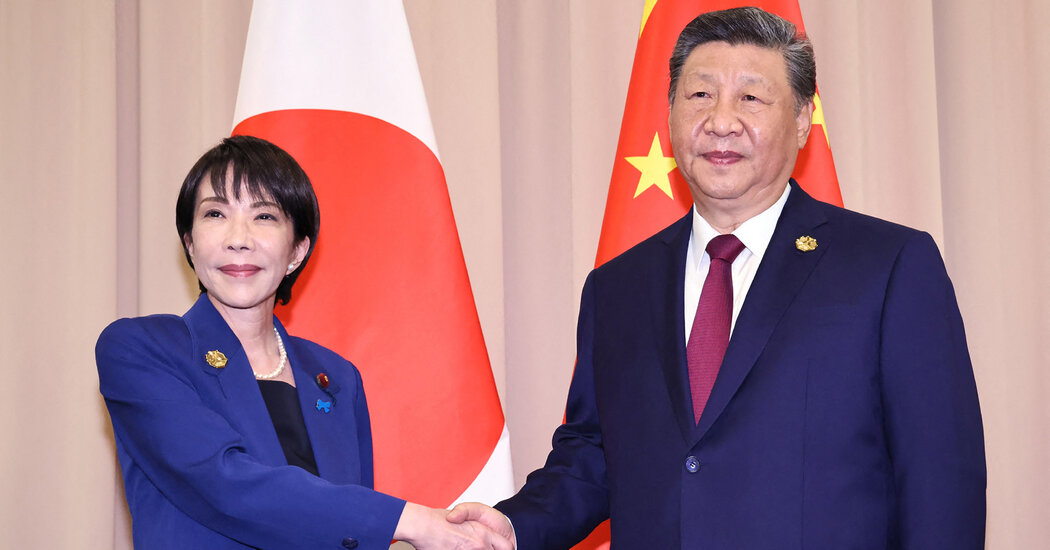
Infuriated by comments about Taiwan by Japan’s new prime minister, Sanae Takaichi, China has unleashed a stream of vitriol, including a threat by a Chinese diplomat to cut off the leader’s “filthy neck.”
The abuse abruptly ended a honeymoon between Ms. Takaichi, in office for less than a month, and China. She had met China’s top leader, Xi Jinping, just last month in South Korea, with the two leaders warmly shaking hands and smiling.
It also ended China’s turn away from so-called wolf warrior diplomacy, an aggressive, in-your-face approach to foreign relations that took shape after Mr. Xi rose to power in Beijing in 2012 but had largely faded in recent years.
Relations between China and Japan have for decades been prone to intemperate feuds fueled largely by bitter Chinese memories of World War II, when the Japanese army committed multiple atrocities, including the 1937 Nanjing Massacre, crimes for which Beijing believes Tokyo has never sufficiently apologized.
The latest eruption between the two Asian powers began on Friday with Ms. Takaichi’s response to a question in Parliament about potential “survival-threatening situations,” a classification that, under Japanese law, allows the deployment of the country’s military forces.
Ms. Takaichi said that an attempt by China to blockade or seize Taiwan, which lies less than 70 miles from Japanese territory and sits astride shipping lanes vital for Japan’s economic survival, could constitute such a situation. China considers Taiwan, a self-governed democracy, part of its territory.
“If it involves the use of warships and the use of force, I believe that this could constitute an existential threat, no matter how you look at it,” she told Parliament.
On Monday, she recalibrated slightly, saying that her comments did not constitute a change in government policy.
China’s foreign ministry, unsatisfied, demanded that she retract her remarks, complaining on Thursday that she had “remained unrepentant.” A spokesman cited “innumerable crimes” by Japan during its colonial rule of Taiwan before 1945 and what it said was its repeated use of “the so-called ‘crisis of survival’ as a pretext to launch foreign aggression.”
Hu Xijin, a prominent Chinese nationalist, denounced Ms. Takaichi on social media as “an evil witch” who had “successfully ignited a new explosion of mutual hatred between Chinese and Japanese public opinion.”
China’s state broadcaster, China Central Television, ran a commentary this week warning that Japanese leaders who interfere in Taiwan are “doomed to dig their own graves.”
“Those who ignite the fire will be burned by it,” the commentary added, likening Ms. Takaichi’s reference to “survival-threatening situations” to Japan’s 1931 invasion of Manchuria in northeastern China.
Though not a significant revision of Japan’s longstanding position of support for Taiwan, Ms. Takaichi’s initial comment broke with previous policy of avoiding any explicit mention of Taiwan in the context of “survival-threatening situations.” Like the United States, a close military ally, Japan had previously stuck to a policy of strategic ambiguity that left its intentions vague with relation to any future Chinese military attack on Taiwan.
Even Shinzo Abe, the former Japanese prime minister who was Ms. Takaichi’s political mentor and shared hawkish views on China, had avoided detailing how Japan might respond to a crisis over Taiwan. In recent years, Japanese leaders have repeated a vague expression of solidarity: “A Taiwan crisis is Japan’s crisis.”
China is particularly sensitive to Japanese statements on Taiwan. Japan ruled the island from 1895 until 1945 as its colonial power and left behind an educated elite that often felt closer to Japan than China. Taiwan’s first democratically elected president, Lee Teng-hui, who spoke fluent Japanese and presided over the island’s transition to full democracy in the 1990s, was routinely denounced by Beijing as a Japanese agent.
Jean-Pierre Cabestan, a political scientist in Hong Kong and the author of Facing China: The Prospect for War and Peace, described this week’s Sino-Japanese ruckus as a “clear return to wolf warrior diplomacy.” What Japan’s prime minister told Parliament, he added, “is the truth: If China attacks Taiwan, it will be impossible for Japan to stay out of the conflict. Just look at the map.”
In response to Ms. Takaichi’s remarks, Xue Jian, China’s consul general in Osaka, Japan, said in a post written in Japanese on the social media platform, X: “That filthy head that has come charging forward on its own accord will have to be cut off without a moment’s hesitation. Are you prepared for that?”
Senior political figures in both governing and opposition parties in Japan interpreted that as a death threat and demanded Mr. Xue’s expulsion.
Referring to Mr. Xue’s message, the United States ambassador in Tokyo, George Glass, posted his own message. “The mask slips — again,” the ambassador wrote. “Time for Beijing to behave like the ‘good neighbor’ it talks repeatedly about — but fails repeatedly to become.”
The Chinese diplomat in Osaka deleted his post.
Ms. Takaichi, Japan’s first female prime minister, has been a vocal defender of Taiwan. She met with a representative of the island at the regional summit in South Korea, drawing criticism from Chinese officials.
Hisako Ueno contributed reporting from Tokyo.
Andrew Higgins is the East and Central Europe bureau chief for The Times based in Warsaw, on temporary assignment in Shanghai.
The post China’s ‘Wolf Warrior’ Diplomacy Returns With Threat Against Japan’s Leader appeared first on New York Times.



